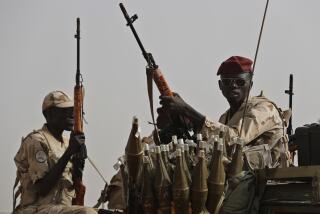Kashmir Massacre Shakes Village’s Sense of Fraternity
NADIMARG, India — Days after a massacre, Lassa Koul’s wooden crutches still lie under the tree where it all happened, half a dozen sandals scattered around. Coating the ground is a layer of autumn leaves, splotched red with blood.
Last Sunday, gunmen came into this isolated Hindu village and ordered everyone from their homes. The gunmen gathered villagers in a clearing beneath the tree and shot them at close range. Of the 54 people who lived here, 24 are now dead.
The killings devastated Nadimarg, a collection of red brick houses set amid rice fields and apple trees sprouting spring buds. The victims ranged from 65-year-old Koul, who lost a leg in a long-ago road accident and hobbled out on his crutches, to a 2-year-old boy named Manu.
For the Hindus of Kashmir, the only majority Muslim state in overwhelmingly Hindu India, what happened here could change everything.
Many worry that the massacre -- blamed on Muslim militants -- could end centuries of quiet commonality that tied Hindus and Muslims together amid one of the world’s bloodiest insurgencies.
“We can’t stay here,” said Vijay Kumar Bhat, a teacher who returned from a trip to find his entire extended family of eight murdered. “I can’t stay in this house. Everyone is dead.”
Now, many remaining Kashmiri Hindus may follow him. Thirteen years ago, in the early days of a Muslim militancy that exploded after India allegedly rigged state elections, some 80% of Kashmir’s 250,000 Hindus fled the region. In the years since, more than 60,000 people, mostly Muslims, have died in related violence.
Today, less than 25,000 Hindus remain in Kashmir, mostly in scattered villages. Some Hindu migrants have made new lives elsewhere, but most are packed into refugee camps.
For centuries, things were different.
Since Islam swept through the region 700 years ago, Kashmir’s Hindus, known as Pandits, have been an integral part of Kashmiri culture. They speak the same language, eat many of the same foods, farm the same fields. Friendships regularly cross religious boundaries.
“Kashmiriyat,” it is called, the unifying culture in which beliefs mark differences between Kashmir’s people but don’t keep them apart.
Despite the brutality of the attack, there are no fears of sectarian revenge attacks here. While relations between longtime rivals India and Pakistan -- nations separated by a Hindu-Muslim divide and individual claims to Kashmir -- plummet again, the region’s Muslims and Hindus remain close, with the killings considered the work of fringe extremists or outsiders.
Over the last few days, India and Pakistan have exchanged angry words over the attack, stepped up regular cross-border shelling and traded test-firings of nuclear-capable missiles.
In Nadimarg, though, Kashmiriyat holds sway. After the killings, Muslim villagers came forward with comfort, food and wood for Hindu cremation rituals.
Bhat, the teacher whose family was slain, now spends much of his time resting on a blanket in his yard. His green eyes are red with grief and he seldom speaks. Instead, he sits with more than a dozen men who offer silent support. Many are Muslim.
“We have lived together in peaceful fraternity,” said Shyam Lal, a retired teacher from a neighboring village. “Everybody was helping each other, and there was no discrimination in religion.”
It remains unclear who is responsible for the killings.
The gunmen wore army uniforms, but their civilian boots and fluent Kashmiri (few soldiers here are from the region) made some in Nadimarg suspicious, and they fled into the fields or hid. Their suspicions proved true as screaming began, and gunfire echoed throughout the village.
The primary suspects are Muslim militants fighting for an independent Kashmir or a merger with neighboring Pakistan.
The state government recently has been reaching out to moderate separatists and urging Pandit refugees to return.
Perhaps, some say, the killings were meant to stop moves toward peace. Others see complicated conspiracies: perhaps Indian soldiers trying to blame militants.
India blamed the attack on Pakistan, which it long has accused of supporting the militants. Pakistan, for its part, denies giving more than moral support to the guerrillas and repeatedly has denounced the massacre.
In Kashmir, though, the question now is how many Hindus will remain. Since the killings, angry Pandits have demanded government help so that they can leave, chanting “Migration! Migration!” at politicians.
In Nadimarg, many Pandit homes have been empty for years, their walls collapsed, their belongings long stolen.
Fear, it seems, could empty many more.
More to Read
Sign up for Essential California
The most important California stories and recommendations in your inbox every morning.
You may occasionally receive promotional content from the Los Angeles Times.










